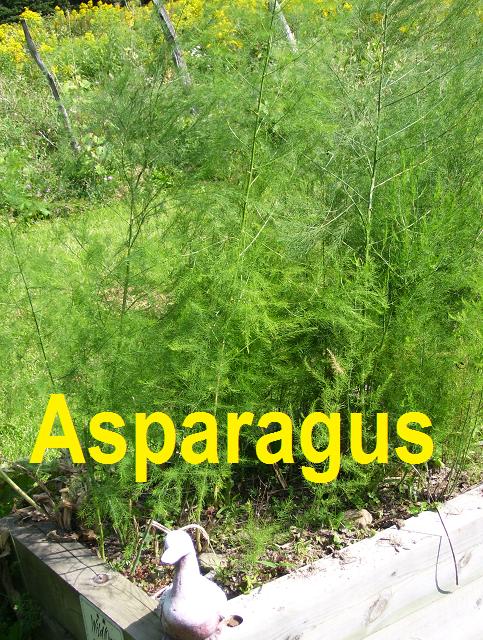~ASPARAGUS~ (Asparagus officinalis)
 When April arrives, and after a week of warm weather, I search each morning for the first asparagus spear to poke its head out of the cool soil......and when I see it, I always let out a very loud sqeal. Asparagus season has begun!!! When April arrives, and after a week of warm weather, I search each morning for the first asparagus spear to poke its head out of the cool soil......and when I see it, I always let out a very loud sqeal. Asparagus season has begun!!!
Spring greens are great, but Asparagus is an entire, filling side dish----very filling. This is an important signature of asparagus as it tells us by its richness-"Don't eat a whole lot of me". While this is not a toxic plant, it is a medicianal one, especially in terms of clearing the kidneys and getting our "spring sap" moving. Everybody who has eaten this plant can attest to the smell it imparts to urine. It is a very strong diuretic and healer of kidney/bladder tissues--which are often overworked by a winter of sluggish activity. Eating a serving per day in the spring season is fine, eating 2 or more servings then becomes taxing on the kidneys. People often ask me--"Is it OK to eat Asparagus in the winter or anytime out of its short spring season?" I feel an occasional indulgence for a special meal is fine any time, but buying asparagus weekly, all year, just because you can is not what nature intended. It is a prime spring tonic and should be enjoyed and respected as such.
Medicinally, Asparagus can be used for those with weak kidneys, infrequent urination, difficulty sweating, constipation, congestive heart issues, retention of water which results in swelling, kidney stones......all health concerns caused by obvious water/fluid imbalances. However, less obvious illnesses caused by the bodies inability to process fluids efficiently, are arthritis, sciatica, tight muscles and tendons and cramps. The question then, most people suffer with these issues ALL year, so how can asparagus help if eaten only in the spring? There are theories that if during each season, the appropriate organ systems are attended to, the other systems will become healthier and over the course of a few years, general health will improve greatly. Also, though, if you suffer from any one of the above listed problems, asparagus can then be used on a limited basis as a medicine--that luckily happens to taste good. If you have constipation, a few helpings over a few days may clear up the problem. However, so many herbs can work on several diseases, that it is probably better to search out those that are more in season, and native to your region, and change them as the seasons change---always looking forward to Spring's asparagus crop!
Medicinally, not only the spear is eaten, but also, the roots decocted and drunk as a tea (not as good tasting!). Whichever part you are eating either as a tonic or medicine--or simply for taste---do not boil them! It is such a waste. Boiling releases all the healthful constituents into the water which you throw away. A better way of preparation is steaming or roasting with a bit of olive oil, salt, pepper and thyme. Eating raw asparagus does not usually inspire anyone as it is tough and stringy---but---you can use a vegetable peeler to shave it very thinly--into ribbons--and use it on salads. Very sublime and nice.
Growing your own asparagus is not complicated as it is a long growing perennial. Plantings can last 30+ years if kept weeded. All you need is a sunny, well drained spot. A family of four would get by nicely on 100 plants. There is a lot of hoopla about planting it the "right" way--which is to dig a trench, build a mound for EACH root and then gently spread the roots over the mound, fertilize and cover. I have never had time for that sort of pampering and always harvest fine asparagus. I dig my trench and put in the roots, put in a little compost and cover. Then every Fall, I put leaves and some more compost on. It is up to you. When it comes up in the spring, it is usually in April after a spell of warm weather. But, April is so fickle and after 70 degree days, we can have several freezes in a row or periodically. Asparagus is sort of wimpy in terms of handling freezes for a plant that comes up so early--a good freeze will kill a newly emerged spear. So, once they start coming up, do cover them if a hard feeze threatens and/or pick daily and early so there aren't a lot of spears just hanging around. For those that do get nipped, a new spear will come up to replace it after a few weeks. The more you cut, the more come up--so tend asparagus daily. The hardest part of growing Asparagus is NOT picking it the first 2-3 years while the roots establish themselves. All you get to do the first two years is enjoy the summer long show of foliage and red berries. The third summer is when you begin harvesting only spears that are as a big as a pencil.
So, for the 2 month season, enjoy soups, salads, roasted veggie medleys, casseroles and freeze several helpings for the mid-winter blahs.
* For more information and recipes: click here
|